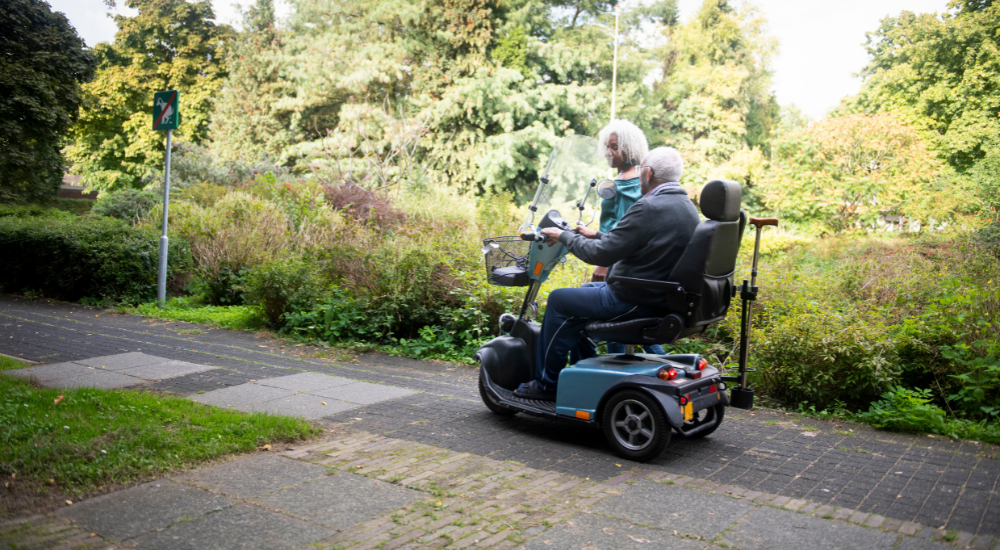
Are you stuck deciding between a mobility scooter and an electric wheelchair? Both offer unique benefits and cater to different needs, making the choice highly personal. Learn more about their key differences below to help you determine which one best suits your lifestyle!
What Is a Mobility Scooter?
Mobility scooters are assistive devices that generally have three wheels and require two hands to operate and steer. The steering mechanism requires more upper body and core strength. With a larger battery and a better design for moving over uneven ground, mobility scooters are well-equipped for traveling outdoors and over longer distances.
What Is a Power Wheelchair?
Power wheelchairs have four wheels and can generally be driven one-handed, but in some cases can be fitted with steering devices able to be maneuvered by small head or mouth movements. Because the steering requires less upper body strength, power wheelchair users require less upper body strength and mobility.
Unlike mobility scooters, power wheelchairs are better for flat terrain or slight slopes, such as access ramps. The distance you can travel on a full charge will vary depending on the terrain and weight of the user.
Mobility Scooters vs. Electric Wheelchairs: How They Compare
1. Turning Radius and Maneuverability
Mobility scooters are great for outdoor use and open spaces because they have a larger turning radius. Power wheelchairs, on the other hand, have a tighter turning circle, which usually makes the preferred choice for maneuvering indoors and around furniture.
2. Speed and Range
Scooters typically offer higher top speeds, up to 15 miles per hour, and have a longer battery life. Some models can travel up to 35-40 miles on a single charge. Electric wheelchairs are generally limited to speeds of around 6 miles per hour and have a much more modest range of around 10-15 miles.
3. Weight Capacity
Medical scooters tend to have higher weight limits, with some models accommodating individuals up to 600 pounds. Standard power wheelchairs have a capacity of around 250 to 300 pounds. That said, bariatric electric wheelchairs are built to hold anywhere from 300 to 700 pounds.
4. Customization and Comfort
Most power wheelchairs have features like adjustable seating, tilt and recline functions, and a wide range of accessories to cater to specific needs. Some electric scooters may offer a few customization options, but they tend to have a more standardized design with less flexibility.
5. Portability and Transportability
While electric wheelchairs are more stable and comfortable, they’re often bulkier and harder to transport than mobility scooters. Many scooter models can be disassembled and or folded for easy storage, which might make them a more practical option for some.
Which One Is Right for You?
The correct mobility aid for you will depend on what you’re comfortable with and what your independence needs are.
Mobility scooters are designed for those who may be fairly mobile around the home but have some trouble walking long distances. The larger turning radius and overall shape of the scooter make them ideal for outdoor excursions, but not impossible to use indoors if needed.
Power wheelchairs are ideal for those who need more mobility and independence in every facet of life. Their smaller turning radius compared to mobility scooters makes them more suited for indoor use. Power wheelchairs have more options for seating comfort such as reclining backrests and lowered footrests, making them an excellent choice if you spend a great deal of time in your mobility aid.
FAQs
Will Medicare Cover a Mobility Scooter?
Yes, Medicare Part B will cover some of a mobility scooter and other durable medical equipment, as long as you meet certain eligibility requirements. After your yearly deductible, you will be responsible for 20% of the costs, leaving Medicare Part B to pick up the other 80%.
Will Insurance Pay for a Wheelchair?
Most insurance providers will pay for a wheelchair if you meet specific criteria. The amount insurance will cover is different depending on who your coverage is through.
Do You Have to be Disabled to Use a Mobility Scooter?
No, you do not need to be disabled or have a disability to use a mobility scooter. They can be useful for people who struggle to walk, recovering from injuries, or any other instance. Use a mobility scooter if it will directly improve your mobility and independence.
Have Questions? Contact Our Assistive Technology Professionals Today!
Freedom Mobility is the leading expert in wheelchairs and mobility devices in California. With our expertise in mobility issues and stellar patient care, our assistive technology professionals can find you the mobility device that you need to regain your independence.
Contact us here to learn more!
September 4, 2024 by Freedom Mobility
Are you stuck deciding between a mobility scooter and an electric wheelchair? Both offer unique benefits and cater to different needs, making the choice highly personal. Learn more about their key differences below to help you determine which one best suits...